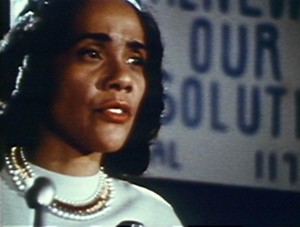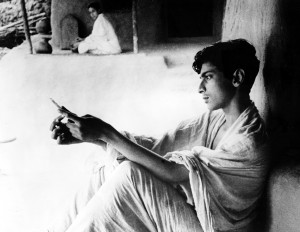BLACK INDEPENDENTS PROGRAM
Co-presented by Bucknell’s History Department.
I AM SOMEBODY
Madeline Anderson (1970) 30 min. 16MM.
I Am Somebody should be considered a landmark in the history of black and feminist documentary practices, yet it has languished in near-obscurity for decades. Commissioned by New York Local 1199, the film chronicles a 1969 strike by 400 hospital workers in Charleston, SC. All were poor and black, and almost all were women. Madeline Anderson, a skilled documentarist who had worked on The Cool World (Shirley Clarke) and Black Journal (Bill Greaves), as well as her own projects, partnered with 1199 to make a film that is less an example of plain reportage than a commemorative object, designed to elicit worker identification, solidarity, and resistance. Print courtesy of the Reserve Film and Video Collection of The New York Public Library for the Performing Arts. Preserved with funding from the Carnegie Corporation of New York.
Playing with
IN MOTION: AMIRI BARAKA 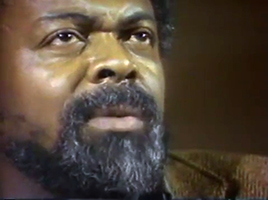
St. Clair Bourne (U.S. 1983) 60 min.
Made in the days leading up to Amiri Baraka’s appeal of his 90-day sentence for resisting arrest following an argument in his car, In Motion profiles the outspoken representative – formerly LeRoi Jones – of the Black consciousness movement. Set in Newark, Greenwich Village, and Harlem, the documentary visits Baraka at home preparing for the American Writers Congress, teaching a college class, hosting a jazz and commentary radio show, reading poetry, and speaking at an anti-apartheid rally. Interviews with writers Allen Ginsberg, Joel Oppenheimer, and A.B. Spellman, and activists Ted Wilson and Askia Toure, provide insight into the modern day revolutionary, and the period which fostered him.
TOP OF PAGE
Tuesday, January 26 at 7pm

THE ASSASSIN – Pennsylvania Premiere!
Hou Hsiao-hsien (Taiwan 2015) 107 min. DCP. With Shu Qi, Chang Chen, Sheu Fang-Yi. In Mandarin with English subtitles.
From one of the most celebrated filmmakers of the 1990s, Taiwanese director Hou Hsiao-hsien, comes Hou’s first feature in eight years, his unexpected entry into the Chinese martial arts wuxia genre. “A stately action movie, graceful and slow-moving, with bursts of smoothly choreographed violence,” (NY Times) The Assassin meticulously and ornately renders the late Tang Dynasty, where provincial rulers challenge the power of the royal court. This is the kind of contemporary cinema made for the big screen! It’s also one of the year’s most notable films, garnering Hou the Best Director prize at Cannes, and extensive accolades for its “ravishingly lovely” images (Wall Street Journal) and its “strange and subtle power” (Telegraph).
The Assassin’s “willful abstractions eventually push the film toward an inversely heightened plane of aesthetic expression, the narrative firmly rooted in the tenets of reality even as the sensory qualities of its presentation begin to resemble something akin to a cinematic fugue state.” – Jordan Cronk, Cinema Scope
TOP OF PAGE
Tuesday, February 2 at 7pm

IN JACKSON HEIGHTS – Pennsylvania Premiere!
Frederick Wiseman (U.S. 2015) 190 min. DCP. In English, Spanish, and Arabic with English subtitles.
In the course of his brilliant, nearly half-century career, Frederick Wiseman has tackled both great social institutions and cultural ones. Here he profiles the Queens community of Jackson Heights, one of New York’s most racially and ethnically diverse neighborhoods, with immigrants from Peru, Colombia, Mexico, India, Bangladesh, and Pakistan, as well as elderly residents of Jewish, Irish and Italian extraction. Under the elevated train, stores sell whole baby goats, saris, and Bollywood DVDs; they offer HIV testing, Tibetan food, and classes for would-be cabbies. Jackson Heights, where 167 languages are spoken, is also home to an activist LGBT community, recent survivors of terrifying border crossings, students of the Quran, and small shop-owners who are mobilizing against the Williamsburg-ization of the nabe. Wiseman’s 40th documentary is “an immersive celebration of democracy [wherein] the ordinary rises to the level of poetry” (The New York Times).
TOP OF PAGE
Tuesday, February 9 at 7pm
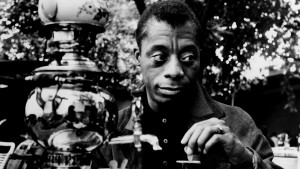
JAMES BALDWIN: THE PRICE OF THE TICKET
Karen Thorsen (U.S. 1989) 86 min.
For years the authoritative film biography of James Baldwin, this newly restored and remastered documentary gathers together scores of rare archival footage of Baldwin and his contemporaries to shape a remarkable account of his life and work. Film Restoration and Digital Remastering made possible by The Ford Foundation, The National Endowment for the Arts, Maysles Documentary Center, Stan & Joanne Marder, Goldcrest Post. Co-presented by Bucknell’s Center for the Study of Race, Ethnicity and Gender and the GRIOT Institute as part of the series Honoring the Legacy of James Baldwin/The Price of the Ticket: African American Artists — Activism, Aesthetics, and the Atelier. Introduced by Carol Wayne White (Religious Studies), Acting Director of the Center for the Study of Race, Ethnicity and Gender (CSREG).
TOP OF PAGE
Tuesday, February 16 at 7pm
APARAJITO (AKA THE UNVANQUISHED)
Satyajit Ray (India 1956) 109 min. DCP. With Kanu Banerjee Sarbajaya, Karuna Banerjee, Smaran Ghosal, Pinaki Sengupta. Bengali with English subtitles.
Satyajit Ray hadn’t planned to make a sequel to Pather Panchali, but after that film’s international success, he decided to continue Apu’s narrative. Aparajito finds Apu and his family living in the bustling holy city of Varanasi, as the wide-eyed child grows into an intellectually curious teenager, eventually studying in Kolkata. Aparajito stands on its own as a tenderly expressive portrayal of a young man’s academic and moral education, while deepening the spiritual dimensions of Apu’s world and the growing complexity of his relationship with his mother.
“Having never seen a Satyajit Ray film is like never having seen the sun or moon.”—Akira Kurosawa
“The beauty of this restoration, particularly if you’ve seen the films in their earlier condition, may be enough to move you to tears….If these aren’t the most beautiful films ever made, they’re the most beautiful ones I know.”
—Stephanie Zacharek, Village Voice
TOP OF PAGE
Tuesday, February 23 at 7pm
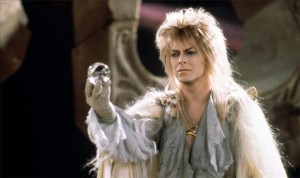
LABYRINTH
Jim Henson (UK 1986) 101 min. 35MM. With Jennifer Connelly, David Bowie.
In Jim Henson’s modern-day Alice in Wonderland cherubic teenager Jennifer Connelly, tempted by David Bowie’s Goblin King, negotiates an eye-popping other world to rescue her kidnapped baby brother. Labyrinth’s live-action/puppet adventure/fantasy has become a cult favorite for children and adults alike.
TOP OF PAGE
Tuesday, March 1 at 7pm
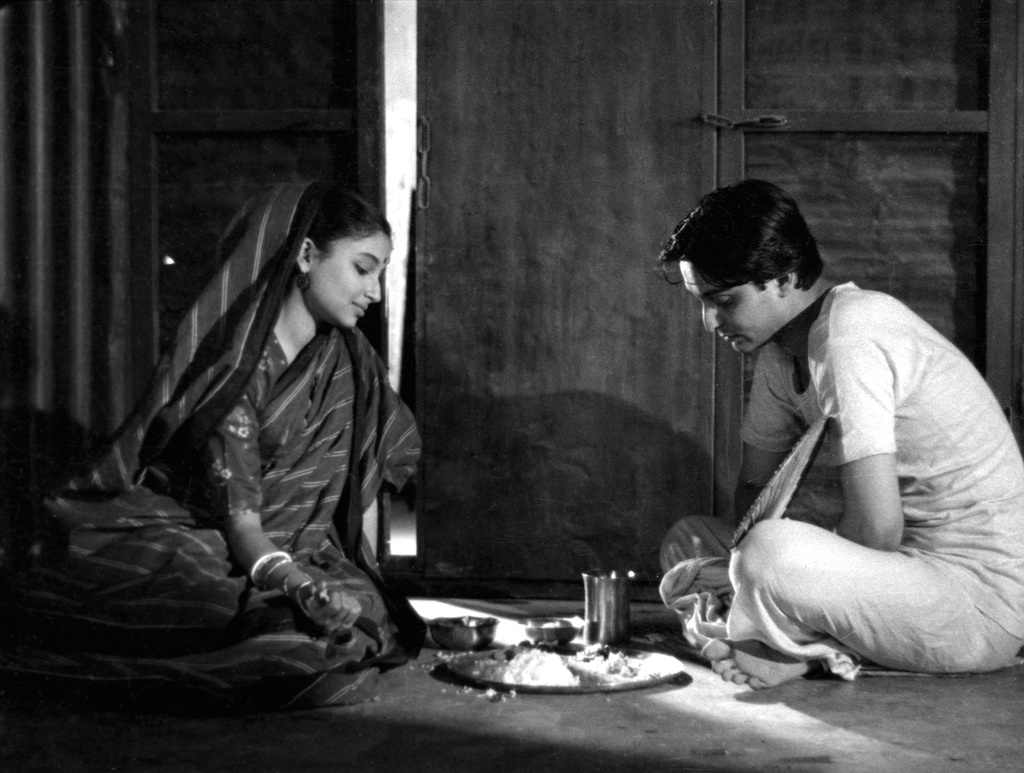
APU SANSAR/THE WORLD OF APU
Satyajit Ray (India 1959) 105 min. DCP. With Soumitra Chatterjee, Sharmila Tagore Kajal, Alok Chakraborty. Bengali with English subtitles
By the time Apur Sansar was released, Satyajit Ray had directed not only the first two Apu films but also the masterpiece The Music Room, and he was well on his way to becoming a legend. This extraordinary final chapter brings our protagonist’s journey full circle; Apu is now in his early twenties, out of college, and hoping to live as a writer. Alongside his professional ambitions, the film charts his romantic awakening and his eventual, fraught fatherhood. Featuring soon to be Ray regulars Soumitra Chatterjee and Sharmila Tagore in star-making performances, and demonstrating Ray’s ever-more-impressive skills as a craftsman of pure cinematic imagery, Apur Sansar is a breathtaking conclusion to this monumental trilogy. Two decades after its original negatives were burned in a fire, Ray’s breathtaking milestone of world cinema has risen from the ashes in a meticulously reconstructed new 4K restoration thanks to Janus Films and the Criterion Collection in collaboration with the Academy Film Archive at the Academy of Motion Picture Arts and Sciences.
“Universally acknowledged as a summit of world cinema.” – James Quandt, ArtForum
TOP OF PAGE
Tuesday, March 8 at 7pm

MY OWN PRIVATE IDAHO
Gus Van Sant (U.S. 1991) 104 min. 35 MM. With River Phoenix, Keanu Reeves, William Richert, James Russo.
A forerunner of the “New Queer Cinema” that was identified in 1992 after a notable year for independent gay and lesbian filmmaking, My Own Private Idaho is a deeply moving look at unrequited love and life on society’s margins. Co-presented by Bucknell’s Gender and Sexuality Alliance
“My Own Private Idaho is an imaginary place where one is locked in the arms of love—that is, both protected and free. It is the promise of America, chronically out of joint with reality, especially for its most vulnerable inhabitants.” – Amy Taubin, “My Own Private Idaho: Private Places”
TOP OF PAGE
Tuesday, March 22 at 7pm
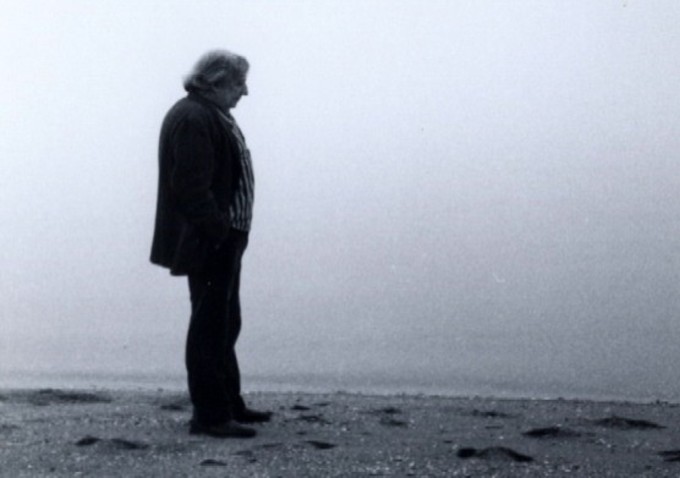
FIRST COUSIN ONCE REMOVED – Director in Person!
Alan Berliner (U.S. 2013) 79 min. DCP.
The latest of Alan Berliner’s “dogged investigations into identity and family, and his strongest work yet” (Nicolas Rapold, The New York Times) is a deeply personal portrait of acclaimed poet and translator Edwin Honig, the director’s good friend, cousin and mentor. A first-hand look at Honig’s journey through the ravages of memory loss and Alzheimer’s disease, First Cousin Once Removed is an unflinching essay on the fragility of being human and a stark reminder of the profound role that memory plays in all of our lives. Preceded by Berliner’s early short Everywhere at Once (1985, 10 min. 16mm), a musical montage, synchronized symphony and journey in images at the speed of sound.
“Heartbreaking, haunting and unexpectedly heartening, First Cousin Once Removed is an uncommonly moving documentary portrait of a mind in disarray. Its unblinking look at a once-formidable intelligence descending into the abyss of Alzheimer’s succeeds because of a fusion of subject and filmmaker that is transcendent.” – Kenneth Turan, Los Angeles Times
TOP OF PAGE
Tuesday, March 29 at 7pm
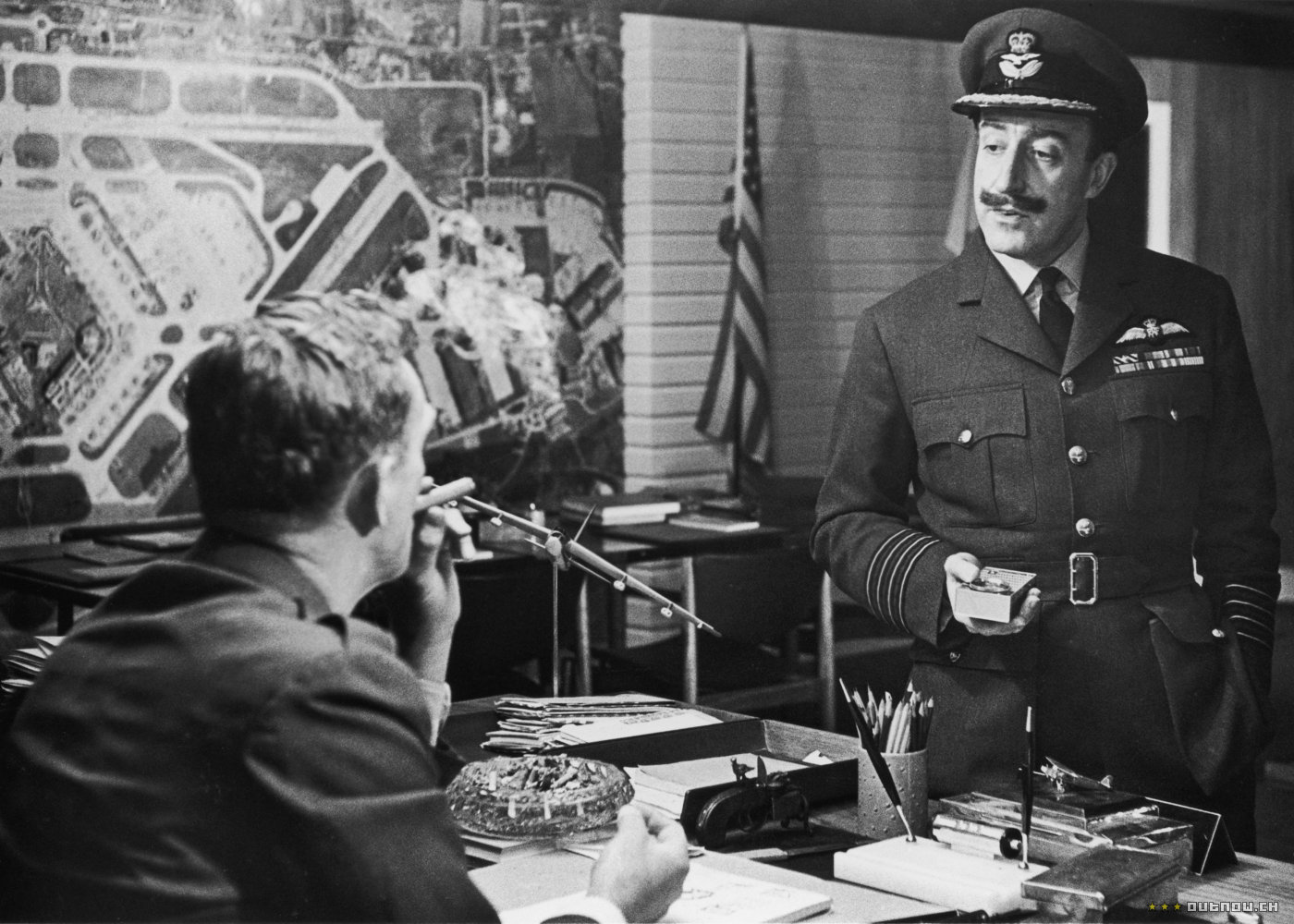
DR. STRANGELOVE OR: HOW I LEARNED TO STOP WORRYING AND LOVE THE BOMB– Restored!
Stanley Kubrick (U.S. 1964) 102 min. DCP. With Peter Sellers, George C. Scott, Sterling Hayden, Slim Pickens.
When a psychotic Air Force General who believes his impotence was caused by a Communist scheme unleashes an attack against the Soviet Union, the U.S. President gathers his generals and an ex-Nazi physicist in the war room, in a desperate effort to de-escalate a nuclear war. Kubrick’s political farce is timeless black comedy at its absurdist best. With Peter Sellers shining in three roles: as the President, a British Captain, and the infamous title character. Co-presented by the Samek Art Museum, this screening runs in conjunction with the Downtown Gallery exhibition Collect Call. New media artist Marisa Olson engages the Samek’s collection for that show, and has selected Dr. Strangelove for the Tuesday series because of its influence on her thinking about technology and machine culture, and their relationship to the evolution of American life, fears and fantasies.
“A goonish-ghoulish portrait of diplomatic insanity that’s zippy, ruthless, and cartoonish enough that the flick is worshipped even among those who can’t stand Kubrick’s later, fastidiously methodical movies.” – Eric Henderson, Slant Magazine
TOP OF PAGE
Tuesday, April 5 at 7pm

FLOWERS OF FREEDOM – Director in Person!
Mirjam Leuze (Germany 2014) 96 min. DCP. Kyrgyz, Russian, English with English subtitles.
Every day huge trucks thunder through the Kyrgyz village of Barskoon carrying a deadly freight: cyanide, which is used to extract gold at the nearby Kumtor goldmine. Seven years after a deadly accident involving trucks crashing into a river that runs through the village, the Kyrgyz government has done nothing and a handful of courageous women begin to fight for the rights of the victims. Flowers of Freedom depicts the political commitment displayed by an otherwise ordinary network of women struggling for justice while managing to survive in a Kyrgyz village. Co-sponsored by the Provost’s Office and the Center for Sustainability and the Environment (BCSE), the Environmental Studies Program, Geology & Environmental Geosciences Dept., German Program, International Relations Dept., Place Studies Program (in BCSE), Political Science Dept., Russian Studies Program and the Sociology and Anthropology Dept. This screening launches Bucknell’s 2016 Sustainability Symposium. The screening will be followed by a panel and audience conversation with the filmmaker Mirjam Leuze; the star of the film Erkingul Imankodjoeva – environmental activist and former Member of Parliament of the Kyrgyz Republic; and Bucknell Professor Amanda Wooden.
TOP OF PAGE
Tuesday, April 12 at 7pm
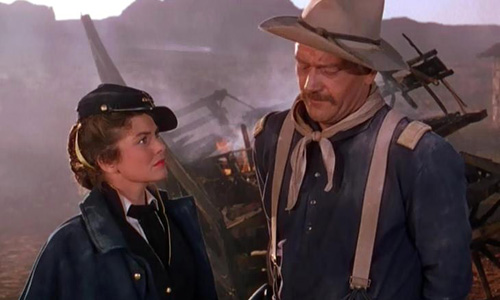
SHE WORE A YELLOW RIBBON
John Ford (U.S. 1949) 100 min. 35 MM. With John Wayne, Joanne Dru, John Agar, Ben Johnson.
Ford’s personal favorite among his loose “cavalry trilogy” tells the sentimental tale of the last Indian campaign of a soon-to-retire captain (Wayne). Displaying the director’s abiding interest in the military as a way of life and as a model of community where personal responsibility is critical above all, She Wore a Yellow Ribbon is also a visual feast. Winton Hoch’s Oscar-winning cinematography captures the Monument Valley landscape in sumptuous colors evocative of the vivid reds and browns of the Frederic Remington’s paintings that Ford acknowledged as an important inspiration. This UCLA print is renowned among archivists as among the greatest successes in preserving nitrate Technicolor. Preservation print courtesy of the UCLA Film & Television Archive. Preservation funding provided by The Film Foundation and the AFI/NEA Preservation Grants Program. Co-presented by the Literary Studies Program (English Department) and Introduced by Professor Alf Siewers.
TOP OF PAGE
Tuesday, April 19 at 7pm
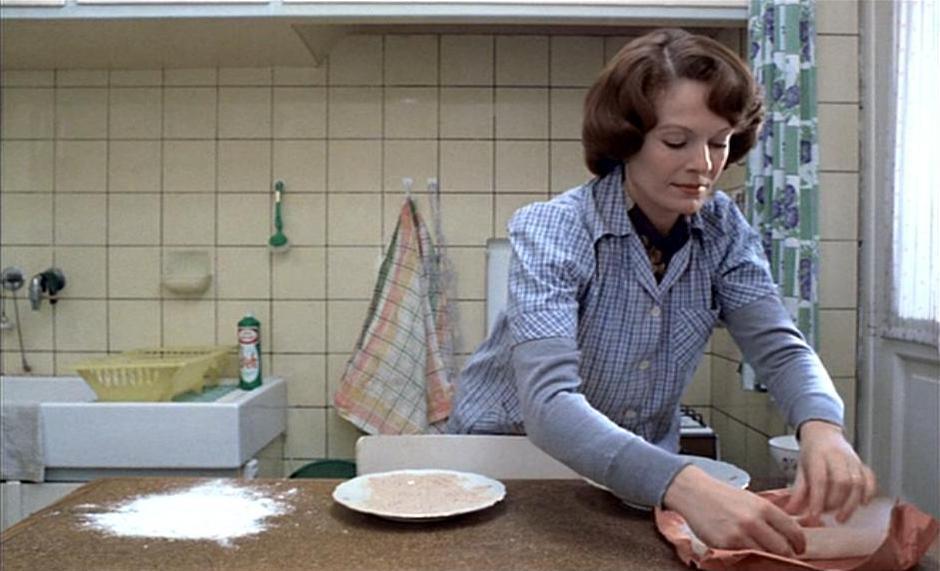
JEANNE DIELMAN, 23, QUAI DU COMMERCE, 1080 BRUXELLES
Chantal Akerman (Belgium, France 1975) 201 min. 35 MM. With Delphine Seyrig, Jan Decorte, Henri Storck. In French with English subtitles.
A singular work in film history, Chantal Akerman’s Jeanne Dielman meticulously details, with a sense of impending doom, the daily routine of a middle-aged widow whose chores include making the beds, cooking dinner for her son, and turning the occasional trick. Made when the artist was only twenty-five years old, the movie can be seen as an exacting character study, as one of cinema’s most hypnotic and complete depictions of space and time and–as it was hailed by feminist critics when it came out–as an impressive alternative to well-intentioned but conventional political documentaries and features. Co-presented by Bucknell’s Programs in French & Francophone Studies and Women’s and Gender Studies and the Center for the Study of Race, Gender and Ethnicity.
TOP OF PAGE
Tuesday, April 26 at 7pm
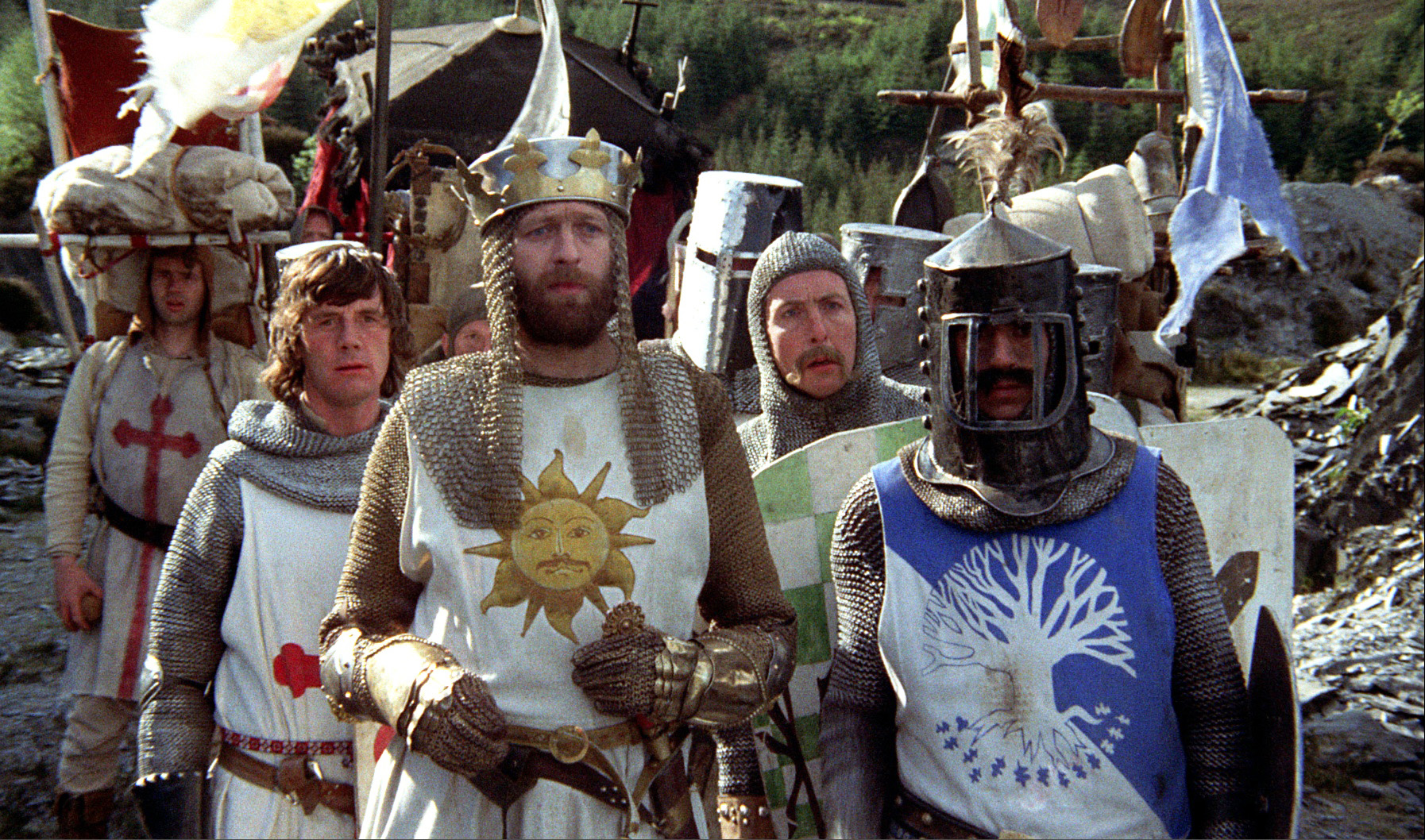
MONTY PYTHON AND THE HOLY GRAIL – A Knight at the Movies with Provost Altmann!
Terry Gilliam and Terry Jones (UK 1975) 91 min. 35MM. With Graham Chapman, John Cleese, Eric Idle, Terry Gilliam, Terry Jones and Michael Palin.
From its opening multi-language titles (that sure looks like Swedish) to the closing arrest of the entire Dark Ages cast by modern-day bobbies, Monty Python and the Holy Grail’s irreverent wit made it an instant cult classic. Savaging the legend of King Arthur with an unending stream of anachronistic one-liners, non-sequiturs, and slapstick set pieces, the Pythonites’ Knights of the Round Table set off in search of the Holy Grail on foot to encounter one absurd escapade after another, from the limb-impaired Black Knight, to the immortal Knights who say Ni, killer rabbits, the Black Beast of Aarrgghh and the extremely rude Frenchman.
